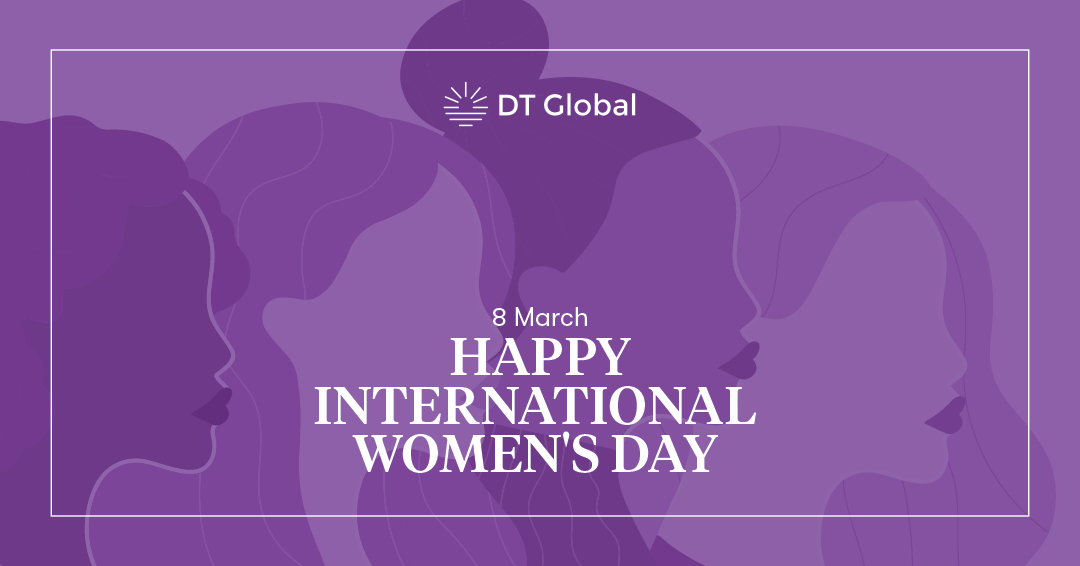
DT Global reaffirms our commitment to eliminating discrimination against women and driving positive change to ensure gender equity for all women across the globe.
This year DT Global’s project and corporate staff celebrated International Women’s Day in their own unique ways with some honouring this year’s UN theme ‘DigitALL: Innovation and technology for gender equality,’ while others chose to celebrate the social, economic, cultural, and political achievements of women and girls more generally.
DT Global opened IWD celebrations with a video promoting the importance of women’s leadership in the international development sector, beginning with the next generation of female leaders from our Emerging Leaders International Development program in the Asia-Pacific.
In celebrating this year’s IWD theme, ‘DigitALL: innovation and technology for gender equality,’ we recognised the amazing work of our DFAT PROSIVU (Partnership for Inclusive Prosperity) female program advisers working in Timor-Leste’s Information and Communication Technology Agency. These women are helping to improve public service delivery to increase economic independence using digital technology and ensuring that everyone can benefit from the use of technology.
As part of the DFAT and MFAT Pacific Horticultural and Agricultural Market Access (PHAMA) Plus’s commitment to gender inclusion, we are supporting women farmers in Taveuni, in the north of Fiji, to pilot an organic ginger farming program. The Fiji team was recently on the island of Taveuni to coordinate the delivery of organically certified ginger seedlings to 20 women-led grower groups to start up their own farms, boosted with hands-on training and mentoring by a local ginger production specialist.
Our USAID Energy Policy Activity (EPA) is working with NARUC (US energy regulatory association), Bosnia and Herzegovina’s regulatory commissions, and other partners to establish the Women in Energy Association. Through this collaboration, Bosnia and Herzegovina is making strides toward increasing the representation and participation of women as leaders in the energy sector to create a brighter future for women in energy.
Our DFAT Partnership for Infrastructure’s (KIAT) program in Indonesia has a new Women in Infrastructure Leadership workstream that aims to improve women’s role in engineering in Indonesia. The workstream will support Women in Public Leadership training with the Queensland University of Technology; commission in-depth research on career pathways for female engineers; and provide technical support for government agencies, engineering associations, state-owned enterprises, and construction companies for women in infrastructure.

Safe travel is a woman’s right. Our FCDO High Volume Transport (HVT) Applied Research Programme calls for women everywhere to feel safe to travel, and to live, without fear of harassment, violence, or discrimination. The HVT Empower project recently published a research paper that shines a light on the sexual harassment women face when travelling in two African cities and provides recommendations for addressing this misunderstood and often neglected issue.
In celebration of IWD, our DFAT Economic and Social Infrastructure Program (ESIP) in Papua New Guinea is celebrating women who are changing societal norms. Seba Kembi, has been working as an electrician for almost 20 years, having spent seven of those years with PNGPower. She is one of the few women working as an electrician in Papua New Guinea, breaking barriers to cultural and societal norms for women. Lyanne Saun, Manager Corporate Governance at Kumul Consolidated Holdings works to appoint, assess, and train Directors across its portfolio of state-owned enterprises, ensuring that diversity is considered across all levels of governance and decision-making.
With support from our DFAT ASEAN-Australia Counter Trafficking (ASEAN-ACT) Program, the ASEAN Commission on the Promotion and Protection of Women and Children is progressing a multi-year project to ensure frontline responders in trafficking cases use victim-centred and gender-sensitive approaches when supporting and protecting victim-survivors. The project activities will enhance the capacity of frontliners to use human rights-based approaches in countering trafficking.

The EU-funded ADELANTE 2, one of our flagship programs in Latin America, recently launched an initiative called ‘Restorative and Therapeutic Justice for Youth and Women.’ Restorative justice brings together those who have been hurt by crime or conflict and those responsible for the harm to repair the damage through mediation. Restorative practice can be used to prevent conflict, build relationships, and repair harm, and gender-sensitive restorative justice helps women and girls to participate safely in mediation processes.
Climate change does not affect everyone equally; it amplifies existing inequalities and is especially detrimental to women and girls in terms of their livelihoods, health, and safety. To help address this issue, USAID Climate Ready partnered with the Fiji Development Bank to develop a Gender Equality and Social Inclusion policy which is now integrated into the bank’s operations. By offering a greater range of services and loan products to women, the Fiji Development Bank is helping to improve the resilience of their families and reduce vulnerability to natural disasters and the effects of climate change.

Our EU-funded EU4 Independent Media (EU4IM) programme incorporates gender sensitivity into its capacity building and mentoring activities for journalists and newsrooms. We’re working to build a more inclusive journalism sector by training on topics such as highlighting female experts, referring to gender statistics and studies in reporting, and avoiding stereotypes in reporting.
IWD places an important spotlight on our continuous fight for equality for all women and girls in all aspects of our work and private lives and reminds us that we all have an opportunity to shape positive change for a more equitable future.